The WORST episodes of Micro Monsters with David Attenborough
Every episode of Micro Monsters with David Attenborough ever, ranked from worst to best by thousands of votes from fans of the show. The worst episodes of Micro Monsters with David Attenborough!
It s a small world after all. In this revolutionary new series, David Attenborough reveals the marvellous adaptability of the most successful group of animals on the planet. Using pioneering macroscopic filmmaking techniques, he explores in unparalleled detail the intricate, sophisticated behaviours of these fascinating creatures and the complexity of the environments they build and inhabit, in a world normally hidden from the human eye. From armies of killer ants to spiders weaving silken trap doors, ferocious scorpions with paralysing stings, beetles shooting boiling chemicals at their enemies, bees communicating with a waggle dance and assassin bugs that clothe themselves in their victims corpses; David Attenborough will as never before take viewers deep into the macroscopic world of bugs.
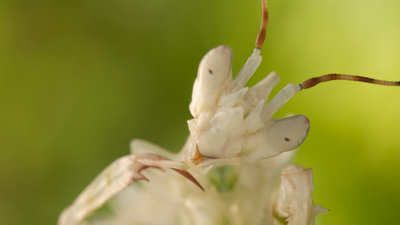
#1 - Courtship
Season 1 - Episode 3 - Aired 6/29/2013
A further selection of creepy-crawly close-ups, focusing on courtship in the bug world. Highlights include scorpions shaking their booty, the perfume-wearing nasonia wasp and the tropical cricket, for whom romance goes out of the window as it uses bribery to seal the deal with would-be partners. One potential partner to steer well clear of, however, is the praying mantis, the female of which is notorious for eating the male just after - or even during - mating. Narrated by David Attenborough.
Watch Now:Amazon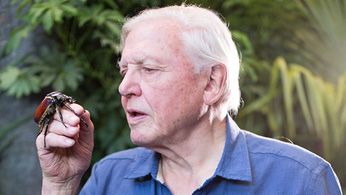
#2 - Conflict
Season 1 - Episode 1 - Aired 6/15/2013
David Attenborough employs the latest technologies to explore the violence, rivalries and deadly weaponry existing within the world of bugs. This first episode examines the survival tactics of its terrifying residents including killer ants, trap-setting spiders and beetles with the ability to shoot boiling chemicals at their enemies.
Watch Now:Amazon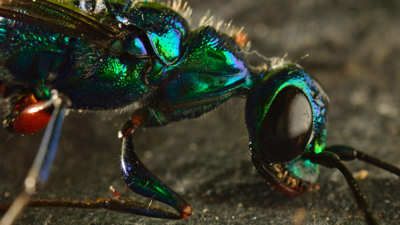
#3 - Predator
Season 1 - Episode 2 - Aired 6/22/2013
David Attenborough continues his bug-eyed view of the world of creepy-crawlies, revealing how predators defuse the defences of their prey. Highlights include the cockroach wasp, busy preparing a tasty - and very live - treat for its young, the whirligig beetle, which employs a water-based radar system, and the jumping Portia spider, which feeds on other arachnids.
Watch Now:Amazon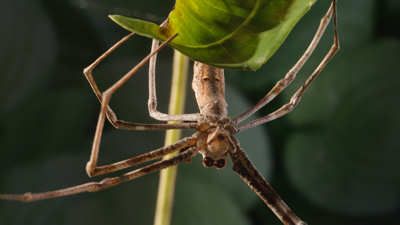
#4 - Reproduction
Season 1 - Episode 4 - Aired 7/6/2013
A close-up view of sex, bug-style, as David Attenborough talks viewers through the different ways in which creepy-crawlies reproduce. Size matters for the minuscule male orb spider, creepily sneaking up on its intended and trying to mate without her noticing, while there's no rest for the lothario-like butterfly, which has plenty of notches on its proverbial bedpost. However, the harvestman spider has no use for sex at all, and reproduces by cloning itself.
Watch Now:Amazon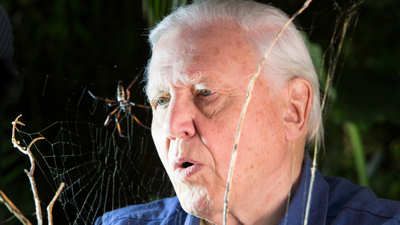
#5 - Family
Season 1 - Episode 5 - Aired 7/13/2013
While most of the series has focused on conflict, this episode is all about co-operation. The suitably named social spiders spin one enormous, 30m web for the whole colony, a queen bee rules her hive with a strict hierarchy and some green ants show great team spirit to help build a nest together. There are no broken societies here. David Attenborough shifts the focus to bugs that prefer cooperation rather than conflict. They include burrowing cockroaches, the suitably named social spiders - which share a 30-metre web.
Watch Now:Amazon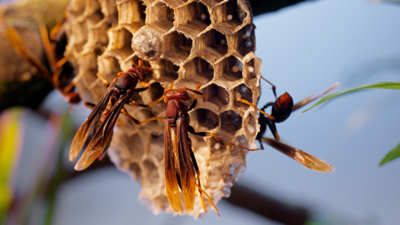
#6 - Colony
Season 1 - Episode 6 - Aired 7/20/2013
Watching the fascinating display of leafcutter ants at the Natural History Museum in London is one of my favourite ways to while away a few hours, but David Attenborough is operating on a much grander scale here in the last in the series. In Argentina he observes some cousins of the leafcutters who are part of a community so vast it spans an entire continent. It’s one of the mandible-dropping facts in a look at one of the key inventions of arthropods: colonies. From termites and honey bees to the leafcutters, it seems that if you want to get ahead, you move to the big city.
Watch Now:Amazon